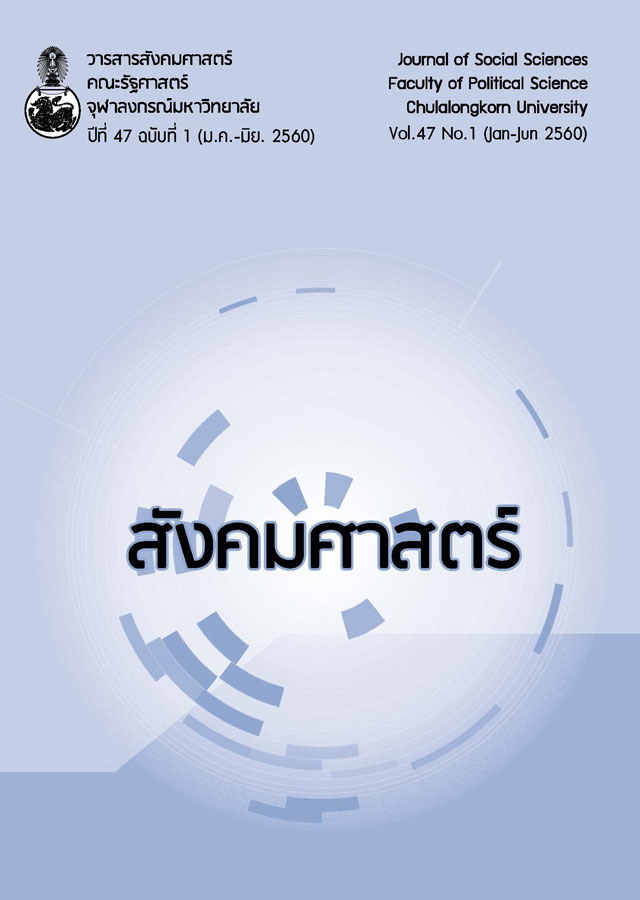ญาณวิทยาต้านอาณานิคม และทฤษฎีความสัมพันธ์ระหว่างประเทศ ของไทยในอนาคต
DOI:
https://doi.org/10.61462/cujss.v47i1.779คำสำคัญ:
ญาณวิทยาต้านอาณานิคม, ทฤษฎีความสัมพันธ์ระหว่างประเทศของไทย, ทฤษฏีหลังอาณานิคมบทคัดย่อ
บทความนำเสนอญาณวิทยาต้านอาณานิคมที่ได้รับพัฒนาการทางความคิดมาจากกลุ่มนักคิดลาตินอเมริกันเพื่อเป็นบทเรียนให้กับการพัฒนาทฤษฎีความสัมพันธ์ระหว่างประเทศของไทยในอนาคต โดยเริ่มต้นจากการแสดงให้เห็นถึงข้อจำกัดของทฤษฎีหลังอาณานิคม และโต้แย้งว่าทฤษฎีหลังอาณานิคมไม่สามารถเชื่อมโยงนัยยะทางความคิดเข้ากับสรรพสิ่งต่างๆ ที่เผชิญกับความทรมาน ทั้งที่เป็นมนุษย์และไม่ใช่มนุษย์ ทฤษฎีหลังอาณานิคมไม่อาจเป็นเครื่องมือที่ก่อให้เกิดการสร้างทฤษฎีความสัมพันธ์ระหว่างประเทศของประเทศที่ไม่ใช่ตะวันตกรวมถึงของไทย บทความจึงหันเหไปสู่ญาณวิทยาแบบโลก‘พหุภพ’ ตามที่รามอน โกรสโฟเกล เรียกว่าเป็น ‘การหันเหสู่การต้านอาณานิคม’ นอกจากนี้ วอลเตอร์ มิกโนโลนักคิดผู้วิจารณ์ปรัชญาตะวันตก ได้สร้างคำเฉพาะหรือมโนทัศน์ของตนเองเพื่อเป็นการต่อต้านญาณวิทยาแบบตะวันตก นักคิดกลุ่มลาตินอเมริกันกลุ่มนี้มอบบทเรียนสำคัญแก่นักวิชาการความสัมพันธ์ระหว่างประเทศของไทย ผู้ปรารถนาได้รับการตระหนักในเชิงทฤษฎีและญาณวิทยาภายในสาขาวิชาความสัมพันธ์ระหว่างประเทศ
Downloads
เอกสารอ้างอิง
Agamben, Giorgio.1998. Homo sacer: Sovereign power and bare life. Stanford, CA: Stanford University Press.
Bartolovich, Crystal. 2016. Postcolonial nature? Or, “If oil could speak, what would it say?”In What postcolonial theory doesn’t say, eds. Anna Bernard, Ziad Elmarsafy, and Stuart Murray. London: Routledge.
Bhabha, Homi. 1994. The location of culture. London: Routledge.
Cardenal, Ernesto. 2009. Pluriverse: New and selected poems, ed. Jonathan Cohen; trans. Jonathan Cohen, et al. New York: New Directions Publishing Corporation.
Cox, Robert. 1981. Social forces, states and world orders: Beyond international relations theory. Millennium – Journal of International Studies 10(2): 126-155.
Dabashi, Hamid. 2015. Can non-Europeans think?. London: Zed Books.
Fanon, Franz. 1963.The wretched of the earth. New York: Grove Press.
Freire, Paulo. 1970. Pedagogy of the oppressed. trans. Myra Bergman Ramos. Harmondsworth, Middlesex: Penguin Education.
Grosfoguel, Ramón. 2012. Decolonizing Western uni-versalisms: Decolonial pluri-versalism from Aimé Césaire to Zapatistas. Transmodernity: Journal of Peripheral Cultural Production of the Luso-Hispanic World 1(3): 88-104.
-----. 2011. Decolonizing post-colonial studies and paradigms of political-economy: Transmodernity, decolonial thinking and global coloniality. Transmodernity: Journal of Peripheral Cultural Production of the Luso-Hispanic World1(1).
-----. 2007. The epistemic decolonial turn: Beyond political-economy paradigms. Cultural Studies 21(2-3): 211-223.
Khader,Jamil. 2013.Žižek’s infidelity: Lenin, the national question, and the postcolonial legacy of revolutionary internationalism. In Žižek now: Current perspectives in Žižek studies, eds. Jamil Khader and Molly Anne Rothenberg. Malden, MA: Polity Press.
Mignolo, Walter. 2011(a).The darker side of western modernity: Global futures, decolonial options. London: Duke University Press.
-----. 1995. The darker side of the renaissance: Literary, territoriality, and colonization. Ann Arbor: The University of Michigan Press.
-----. 2009. Dispensable and bare lives: Coloniality and the hidden political/economic agenda of modernity. Human Architecture: Journal of the Sociology of Self-Knowledge 7(2): 68-87.
-----. 2011(b). Epistemic disobedience and the decolonial option: A manifesto. Transmodernity: Journal of Peripheral Cultural Production of the Luso-Hispanic World 1(2): 44-66.
-----. 2000. Local histories/global designs: Essays on the coloniality of power, subaltern knowledges and border thinking. Princeton: Princeton University Press.
-----. 2016. Yes, we can: Non-European thinkers and philosophers. The Aljazeera, February 19, 2013. http://www.aljazeera.com/indepth/opinion/2013/02/20132672747320891.html (Accessed on December 21, 2016)
Pasha, Mustapha. 2011. Untimely reflections. In International relations and non-western thought: Imperialism, colonialism and investigations of global modernity, eds. Robbie Shilliam. London: Routledge.
Quijano, Anibal. 2000. Coloniality of power, ethnocentrism, and Latin America. Nepantla 1(3): 533-580.
Ramón Grosfoguel."Decolonizing the university". 2nd decolonial days, berlin 2011, YouTube video, 30.39, posted by decolonialgroup’s channel, February 20, 2012, https://www.youtube.com/watch?v=LKgL92yqygk.
Said, Edward. 1978. Orientalism. New York: Pantheon Books.
Sousa Santos, Boaventura. 2014. Epistemologies of the south: Justice against epistemicide. London: Routledge.
Spivak, Gayatri. 1988. Can the subaltern speak?.In Marxism and the interpretation of culture, eds. Cary Nelson and Lawrence Grossberg. New York: Macmillan.
Zabala, Santiago. 2016. Slavoj Žižek and the role of the philosopher. The Aljazeera, December 25, 2012. http://www.aljazeera.com/indepth/opinion/2012/12/20121224122215406939.html. (Accessed on December 21, 2016)
Žižek, Slavoj.2016. A reply to my critics. ThePhilosophical salon, August 5, 2016. http://thephilosophicalsalon.com/a-reply-to-my-critics. (Accessed on December 21, 2016)
-----. 2008. Violence: Six sideways reflections. New York: Picador Books.
ดาวน์โหลด
เผยแพร่แล้ว
รูปแบบการอ้างอิง
ฉบับ
ประเภทบทความ
สัญญาอนุญาต
ลิขสิทธิ์ (c) 2017 คณะรัฐศาสตร์ จุฬาลงกรณ์มหาวิทยาลัย

อนุญาตภายใต้เงื่อนไข Creative Commons Attribution-NonCommercial-NoDerivatives 4.0 International License.
เงื่อนไขการอนุญาตสาธารณะ
นโยบายลิขสิทธิ์และการอนุญาต
วารสารสังคมศาสตร์ จุฬาลงกรณ์มหาวิทยาลัย เผยแพร่เนื้อหาทั้งหมดภายใต้ สัญญาอนุญาตครีเอทีฟคอมมอนส์แบบแสดงที่มา-ไม่ใช้เพื่อการค้า-ไม่ดัดแปลง 4.0 นานาชาติ (CC BY-NC-ND 4.0)
ลิขสิทธิ์
บทความทั้งหมดที่ตีพิมพ์ในวารสารสังคมศาสตร์ จุฬาลงกรณ์มหาวิทยาลัย เป็นลิขสิทธิ์ของ คณะรัฐศาสตร์ จุฬาลงกรณ์มหาวิทยาลัย ผู้เขียนจะโอนสิทธิ์ทั้งหมดให้แก่วารสารเมื่อบทความได้รับการตอบรับให้ตีพิมพ์
สัญญาอนุญาต CC BY-NC-ND 4.0
ภายใต้สัญญาอนุญาตนี้:
-
แสดงที่มา (BY): ผู้ใช้ต้องแสดงที่มาโดยอ้างอิงถึงผู้เขียน คณะรัฐศาสตร์ จุฬาลงกรณ์มหาวิทยาลัย และวารสารสังคมศาสตร์ จุฬาลงกรณ์มหาวิทยาลัย พร้อมทั้งให้ลิงก์ไปยังสัญญาอนุญาต และระบุหากมีการเปลี่ยนแปลง ทั้งนี้สามารถทำได้ในลักษณะที่สมเหตุสมผล แต่ต้องไม่ทำในลักษณะที่แสดงว่าผู้อนุญาตให้การรับรองผู้ใช้หรือการใช้งานดังกล่าว
-
ไม่ใช้เพื่อการค้า (NC): ผู้ใช้ไม่สามารถใช้เนื้อหาเพื่อวัตถุประสงค์ทางการค้า การใช้งานเชิงพาณิชย์จะต้องได้รับอนุญาตเป็นลายลักษณ์อักษรล่วงหน้าจากผู้เขียนและคณะรัฐศาสตร์ จุฬาลงกรณ์มหาวิทยาลัย
-
ไม่ดัดแปลง (ND): หากผู้ใช้นำเนื้อหาไปรวม ดัดแปลง หรือต่อยอด ผู้ใช้ไม่สามารถเผยแพร่งานที่ดัดแปลงนั้นได้ การดัดแปลงผลงานจะต้องได้รับอนุญาตเป็นลายลักษณ์อักษรล่วงหน้าจากผู้เขียนและคณะรัฐศาสตร์ จุฬาลงกรณ์มหาวิทยาลัย
นโยบายการเข้าถึงแบบเปิด
วารสารสังคมศาสตร์ จุฬาลงกรณ์มหาวิทยาลัย ให้การเข้าถึงเนื้อหาแบบเปิดโดยทันทีตามหลักการที่ว่าการทำให้งานวิจัยสามารถเข้าถึงได้อย่างเสรีแก่สาธารณะจะสนับสนุนการแลกเปลี่ยนความรู้ในระดับโลก ผู้ใช้สามารถอ่าน ดาวน์โหลด คัดลอก เผยแพร่ พิมพ์ ค้นหา หรือเชื่อมโยงไปยังเนื้อหาฉบับเต็มของบทความได้โดยไม่ต้องขออนุญาตล่วงหน้าจากผู้จัดพิมพ์หรือผู้เขียน ทั้งนี้เป็นไปตามสัญญาอนุญาต CC BY-NC-ND 4.0
นโยบายการเก็บบันทึกด้วยตนเอง
ผู้เขียนสามารถเก็บบันทึกบทความฉบับตีพิมพ์สุดท้าย ต้นฉบับที่ส่ง (preprint) หรือฉบับที่ผ่านการประเมิน (postprint) ในคลังสถาบันหรือเว็บไซต์ส่วนตัวได้ โดยต้องมีการอ้างอิงการตีพิมพ์ครั้งแรกในวารสารสังคมศาสตร์ จุฬาลงกรณ์มหาวิทยาลัย พร้อมระบุแหล่งอ้างอิงที่สมบูรณ์และลิงก์ไปยังเว็บไซต์ของวารสาร
การขออนุญาต
สำหรับการใช้งานนอกเหนือจากที่ครอบคลุมโดยสัญญาอนุญาต CC BY-NC-ND 4.0 กรุณาติดต่อ:
กองบรรณาธิการ
วารสารสังคมศาสตร์ จุฬาลงกรณ์มหาวิทยาลัย
คณะรัฐศาสตร์ จุฬาลงกรณ์มหาวิทยาลัย
Email: cusocscij@gmail.com
สำหรับข้อมูลเพิ่มเติมเกี่ยวกับสัญญาอนุญาตครีเอทีฟคอมมอนส์แบบแสดงที่มา-ไม่ใช้เพื่อการค้า-ไม่ดัดแปลง 4.0 นานาชาติ กรุณาเยี่ยมชม: https://creativecommons.org/licenses/by-nc-nd/4.0/deed.th





